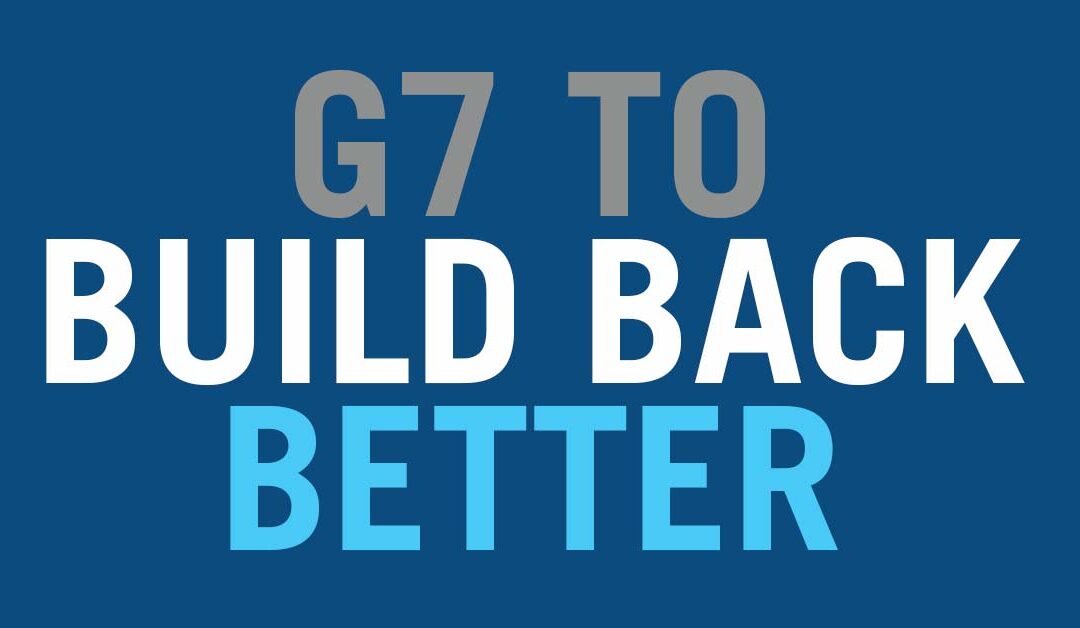Investment in 3-star or better road infrastructure, led by the G7 Build Back Better World (B3W) Partnership launched this week, has immense potential to save lives and support the achievement of UN Targets 3 and 4.
The Build Back Better World (B3W) Partnership is an affirmative initiative for meeting the tremendous infrastructure needs of low- and middle-income countries and addressing road trauma – the biggest killer of young people worldwide.
US President Biden and G7 partners agreed to launch the bold new global B3W initiative, a values-driven, high-standard, and transparent infrastructure partnership led by major democracies to help narrow the $40+ trillion infrastructure need in the developing world, which has been exacerbated by the COVID-19 pandemic.
Through B3W, the G7 and other like-minded partners will coordinate in mobilizing private-sector capital in four areas of focus – climate, health and health security, digital technology, and gender equity and equality – with catalytic investments from the respective development finance institutions.
iRAP CEO Rob McInerney said 500 million people will be killed and injured in road crashes between now and 2030, with the greatest burden felt in low- and middle-income countries where 90 per cent of fatalities occur.
“The Second Decade of Action for Road Safety 2021-2030 has the ambitious target of halving the raw number of road traffic deaths and injuries by 2030 and safer roads investment in developing countries will be critical.
“Investment in 3-star or better road infrastructure, led by the B3W Partnership, has great potential to save lives backed by the evidence base of the global infrastructure safety standard and Business Case for Safer Roads.
“Multi-year partnerships to achieve >75% of travel on 3-star or better roads for all road users can be a win-win-win for health, the economy and employment. 3-star or better investment saves lives, saves money and creates jobs,” he said.
B3W will be global in scope, from Latin America and the Caribbean to Africa to the Indo-Pacific. Different G7 partners will have different geographic orientations, but the sum of the initiative will cover low- and middle-income countries across the world.
In announcing the partnership, G7 partners expressed a unified vision for global infrastructure development and endorsed the guiding principles of B3W:
- Values-Driven. Infrastructure development carried out in a transparent and sustainable manner—financially, environmentally, and socially —will lead to a better outcome for recipient countries and communities. We will offer countries a positive vision and a sustainable, transparent source of financing to meet their infrastructure needs.
- Good Governance and Strong Standards. High standards have become ever more important at a time when governments are grappling with complex decisions on how to tackle climate change, build back local economies, direct scarce financing, and boost employment in an inclusive way. We are committed to providing citizens of recipient communities with the long-run benefits they expect and deserve from infrastructure projects. Our efforts will be guided by high standards and principles, such as those promoted by the updated Blue Dot Network, relating to the environment and climate, labor and social safeguards, transparency, financing, construction, anticorruption, and other areas.
- Climate-Friendly. The investments will be made in a manner consistent with achieving the goals of the Paris Climate Agreement.
- Strong Strategic Partnerships. Infrastructure that is developed in partnership with those whom it benefits will last longer and generate more development impact. Infrastructure created under the B3W will be developed through consultation with communities and assessing local needs as a true partners. We will establish a taskforce together as a G7, and with others, to coordinate, harmonize our efforts, and increase our impact and reach.
- Mobilize Private Capital Through Development Finance. Status quo funding and financing approaches are inadequate to address the tremendous infrastructure gap in low- and middle-income countries. We are committed to augmenting the development finance tools at our disposal to support and catalyze a significant increase in private capital to address infrastructure needs. Infrastructure investment by a responsible and market-driven private sector, paired with high standards and transparency in public funding, is crucial for long-run development effectiveness and sustainability.
- Enhancing the Impact of Multilateral Public Finance. Multilateral development banks and other international financial institutions (IFIs) have developed rigorous standards for project planning, implementation, social and environmental safeguards, and analytical capability. We will work with the IFIs to enhance their catalytic impact and increase the mobilization of capital—both public and private—needed for impactful and sustainable infrastructure investment.
UN Targets 3 and 4 include ensuring all new roads are built to a 3-star or better standard for all road users (Target 3), and more than 75% of travel is on the equivalent of 3-star or better roads for all road users by 2030 (Target 4). Achieving >75% of travel on 3-star or better roads globally by 2030 will save an estimated 450,000 lives every year and 100 million lives and serious injuries over the 20-year life of the treatments. Targeted safe roads investment by all countries of 0.1-0.2% GDP per year through to 2030 will unlock this incredible outcome with $8 of benefits for every $1 invested.
For more information:
- The national and global impact of road trauma and Business Case for Safer Roads – Vaccines for Roads – https://www.vaccinesforroads.org/.
- Social Impact Investment in Safer Roads – https://irap.org/project/innovation-social-impact-investment/

















